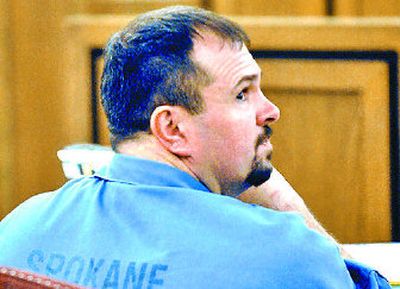Trial begins for man accused of defrauding pole barn customers

If Spokane Valley resident Sam Cover could build pole barns as fast as he could make excuses, officials said, he wouldn’t be wearing “Spokane County Jail” stenciled on his back today.
But empty promises, and in some cases just holes in the ground, are what 29 Spokane County residents say they received for paying Cover thousands of dollars each to build the steel-sided pole buildings, according to court testimony.
Authorities believe Cover pocketed about $1.2 million owed to materials suppliers and more than 100 Spokane County customers. Deputy Spokane County Prosecutor Bob Sargent said Cover used that money to live beyond his means and support his gambling habit.
Authorities have similar allegations from Cover customers in North Idaho, and in Stevens, Pend Oreille and Kittitas counties in Washington, Spokane County sheriff’s Detective Mark Renz said.
“It’s sad that it got this far,” he said.
Cover, a 41-year-old ex-convict, appeared Monday for a scheduled three-week trial in which he is charged with 29 counts of first-degree theft by deception, each of which carries a maximum of about five years in prison.
If he succeeds, Sargent said he will seek to have Superior Court Judge Robert Austin impose an exceptional sentence that could put Cover in prison for much longer.
“Mr. Cover is a thief,” Sargent said. “This court will be satisfied beyond a reasonable doubt … that at the time he signed these contracts, he had no intention of building the buildings. He intended to defraud these victims from the very start.”
But Assistant Public Defender Derek Reid told the judge that the state will have to prove that Cover never intended to build the buildings.
“The problem is that in the records that Mr. Cover kept, however completely and utterly disorganized they are, we see evidence of Mr. Cover conducting business: doing work to work jobs, ordering supplies from suppliers, paying suppliers, paying employees,” Reid said. “That’s intent to complete the job.”
Reid pointed out that Cover did build about 200 buildings similar to the ones promised to the 29 victims in this case.
But even some of those customers became victims, Renz said.
“Some people got their buildings built,” Renz said. “Then they learned they had liens placed on their property because Mr. Cover never paid for the materials.”
Renz began investigating Cover in November 2003 when one victim came forward. “Then the floodgates opened,” he said.
The detective was contacted by the state and federal officials with lists of customers who had the same problem: paying thousands for buildings that never got built.
One of those victims, Karl Eckler, testified Monday about how Cover’s scheme worked.
First Cover and the customer would agree on a price. At the signing of the contract, the customer would pay one-third of the total price. In his case, Eckler initially paid Cover $5,542 and later spent an additional $1,200 to modify the plans.
When the materials arrived, Cover would get a check to cover their cost or essentially the next third of the total price. In Eckler’s case, he paid an additional $4,500 for those materials.
But Eckler later learned that he paid $4,500 for only about $1,200 worth of building supplies.
As time wore on, Eckler said, he called Cover 50 times trying to find out when his 30-by-30-foot shop would be constructed.
For his effort, Eckler said he received excuses that included health issues.
“Others were complaints about his help. One was that he had hurt his back so he couldn’t watch his employees,” Eckler said. “It was always just around the bend … and we could expect at any time for the work to begin.”
In the end, Eckler paid Cover $11,242 for eight or nine improperly dug holes.
Sargent said Cover spent five years in prison after he was convicted in 1995 of doing almost the same thing to 17 other victims. When he learned he was under investigation in this case, he sent a letter to more than 100 disgruntled customers.
Cover informed them that a new construction company, Pacific Northwest, had purchased the contracts from him and the new company would be completing the buildings.
All the customers needed to do was pay Pacific Northwest the remaining third of the contracts owed to Cover plus the cost of materials – even though they had already paid for the wood and steel siding.
Those letters instructed the customers to call Pacific Northwest’s Shane Vangerpen to complete the work.
Turns out, Pacific Northwest never existed, Renz said. Vangerpen, who previously was convicted of attempted murder on a police officer, was working for Cover as a construction foreman.
“It was a way to keep this thing going,” Renz said of the letter. “It’s the old shell game.”